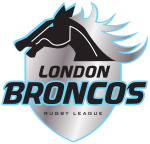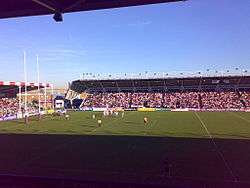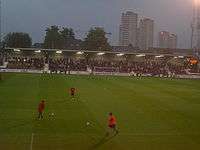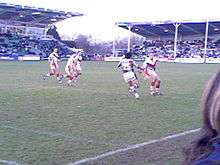London Broncos
 | |
| Club information | |
|---|---|
| Full name |
London Broncos Rugby League Football Club |
| Nickname(s) |
The Broncos The Londoners |
| Website | londonbroncosrl.com |
| Founded | 1980 |
| Current details | |
| Ground(s) | |
| Chairman | David Hughes |
| Head Coach | Andrew Henderson |
| Competition | Championship |
| 2016 RFL Championship | 2nd |
|
| |
London Broncos R.L.F.C. is a professional rugby league club in Ealing, London, who compete in the Kingstone Press Championship, the second tier of professional rugby league football. They competed in the Super League from its introduction in 1996 until the end of the 2014 season. The current head coach is Andrew Henderson, assisted by England and Great Britain internationals Jamie Langley and Danny Ward.
The Broncos are captained by Wes Naiqama and play at the Trailfinders Sports Ground in Ealing, sharing with the rugby union side Ealing Trailfinders.
The club was originally formed as Fulham in 1981, entering the Rugby Football League Championship's second division for the 1980–81 Rugby Football League season. The club has also been known as London Crusaders (1991–1994), London Broncos (1994–2005 and since 2012) and Harlequins Rugby League (2006–2011).
Whilst the club has never won a major trophy, they were finalists in the 1999 Challenge Cup and finished the 1997 Super League season in second place. The only trophy the club has won since its formation in 1980 is the Rugby Football League Championship Second Division in 1982-83.
History
Origins
Professional rugby league was briefly represented in London in the 1930s by London Highfield (1933), Acton and Willesden (1935–36) and Streatham and Mitcham (1935–36). All were speculative clubs set up by local businessmen purely as money making exercises, and were ultimately driven out of business through poor finances. Thereafter, the sport of rugby league in England remained exclusively a Northern game for over forty years until the formation of new club in London, Fulham.
1980-1991: Fulham RLFC
In 1980, Fulham Football Club chairman Ernie Clay, set up a rugby league team at Craven Cottage, with the intention of creating another income stream for the football club. Warrington director Harold Genders, who had helped to persuade Clay of the benefits of starting a rugby league club in the capital, resigned from the Warrington board to become managing director of Fulham RLFC. The Rugby Football League (RFL), keen to encourage the expansion of the sport beyond its traditional Northern heartland, accepted the new club at once. One of the game's leading players, Reg Bowden, was recruited by Genders to act as player-coach and the club's first signing was Roy Lester on a free transfer from Warrington. Within nine weeks, Genders and Bowden had assembled a team of experienced players approaching retirement, together with a few promising youngsters.
Nearly 10,000 Londoners turned up for the opening game at Craven Cottage to see the newly formed side convincingly beat highly-regarded Wigan 24–5. The new Fulham RL team quickly proved to be very competitive and went on to win promotion at the end of their inaugural season. After their initial season, immediate relegation from the first division in 1981–82 was something of a reality check.
Fulham played two "home" games against Swinton and Huddersfield at Widnes in 1983 as the pitch at the Cottage had disintegrated in the wet winter following the collapse of the main drain to the river Thames under the Miller Stand.
Despite winning the Division Two Championship in 1982–83, a second immediate relegation in 1983–84 coupled with continuing financial losses saw Clay, under pressure from the Fulham board, pull the plug at the end of their fourth season. However, with the backing of supporters Roy and Barbara Close and with a new coach, former player Roy Lester, Fulham RL still had a future. Most of the players had moved on as free agents and a new team began life at the Crystal Palace National Sports Centre.
The club moved to Chiswick Polytechnic Sports Ground in 1985. They also played several one-off games at football grounds around London such as Wealdstone, Hendon, Brentford and Chelsea's ground Stamford Bridge in 1983.
Bill Goodwin replaced Lester as coach between 1986 and 1987. In August 1986, Fulham hit a cash crisis and withdrew from RFL 11 days before the start of the season but re-launched in September. Bev Risman was asked to be coach at Fulham in 1987. The team was in the bottom half of the second division. The team struggled for success and Risman left after a couple of seasons and Bill Goodwin returned. Phil Sullivan was coach for just two months between January and February 1989, Goodwin came in for his third spell and held the reins until May 1989 when Ross Strudwick was appointed.
The club returned to Crystal Palace in 1990.
1991-1994: London Crusaders
A 1991 name change to London Crusaders coincided with a slightly more successful period on the pitch.
Ross Strudwick was replaced as coach by Darryl van der Velde in 1992 but continued as manager until 1993. The Crusaders moved from Crystal Palace National Sports Centre to Barnet Copthall arena in June 1993. In November 1993, London Crusaders imposed 20% pay cut to ease financial problems. The RFL briefly owned the Crusaders in 1993-94 as the Bartrams departed but Crusaders' new owners were Britannic Shipping; Strudwick stepped down as manager to give the club's new owners a clean slate.[1]
The climax of the Crusaders era was a 1994 appearance in the Divisional Premiership Final under coach Tony Gordon. They lost 22–30 to Workington Town with Mark Johnson scoring a hat-trick and Logan Campbell also bagging a try.
1994-2005: Broncos and Super League
In the spring of 1994 it was announced that the Australian NRL club the Brisbane Broncos, who had just won back-to-back premierships, was buying the London team, which would be renamed London Broncos. Gordon was replaced by a Brisbane coach, Gary Grienke.[2] The first home game under the Broncos moniker was against Keighley at Hendon F.C.'s ground on Clairmont Road. During a period of improving fortunes they made the 1994 Divisional Premiership Final at Old Trafford.
Despite not playing in the top flight, London Broncos were selected by the RFL to be part of the new Super League competition in 1996 on the basis that it was essential for the sport to have a high profile representative in the capital. In their first year in the top flight, the 1995–96 Rugby Football League season, the Broncos came second last. Former Brisbane Bronco Tony Currie took up the role of head coach.
Broncos moved to southeast London to play at the Valley, home of Charlton Athletic, which is when David Hughes became involved with the club. But after one season they were on their way back to west London to play at the Stoop Memorial Ground.
The 1996 season brought the best London attendances since the inaugural season at Craven Cottage. Tony Rea retired from playing at the end of the season to take up the Chief Executive role at the club.
After two years they moved once again, to the Harlequin rugby union club's Stoop Memorial Ground. Richard Branson's Virgin Group became majority shareholders, and the immediate future looked very bright. In 1997, after a remarkably good season they finished second in Super League. Highlights that year included victories at the Stoop over Canberra in the World Club Challenge and Bradford and Wigan in Super League II.
In 1998, as part of rugby league's "on the road" scheme London Broncos played Bradford Bulls at Tynecastle in Edinburgh in front of over 7,000 fans. Success continued in 1998 with a first appearance in the Challenge Cup semi-finals, losing to Wigan. Head coach Tony Currie left the club at the end of the 1998 Super League season and was replaced by Dan Stains.
In 1999, the club went one better, having its best cup run to date. Following a famous semi-final victory over Castleford, the Broncos reached the Challenge Cup final at Wembley Stadium for the first time, but were defeated 52–16 by Leeds. The club sacked Stains after the Broncos endured a long losing streak during the Super League campaign. Tony Rea was appointed temporary joint head coach with Stains' assistant Les Kiss. Rea and Kiss managed to steer Broncos out of the slump.
The Virgin Group then became the majority shareholder and in 1999, they reached the Challenge Cup Final, losing to Leeds Rhinos in what proved to be the last rugby league game ever to be played at the old Wembley Stadium.
In 2000, John Monie was appointed head coach. Monie only stayed in the job until the last month of the 2000 Super League season with the club endured a mediocre season during his tenure. Rea took over caretaker coach until the end of the season and Broncos sailed to mid-table security. Rea resigned his Chief Executive role at the end of the 2000 season to become head coach on a full-time basis.
York made an approach to Virgin to buy the London Broncos in August 2001 and form a merged club under a new name, York Wasps, to play in Super League.[3]
In 2002, fervent supporter David Hughes purchased the majority shareholding from Virgin in a major restructuring of the club. the Broncos moved back across London to play at Griffin Park as tenants of Brentford FC. 2003 marked the club's first Super League play off appearance, losing in the first round to St Helens 24–6 at Knowsley Road.
The 2005 season was marked by significant activity off the pitch as the club welcomed new chairman and majority shareholder Ian Lenagan who had bought up 65% of the shares. This was followed by the announcement of a partnership with Harlequins Rugby Union Club that saw the side return to Twickenham Stoop, this time renamed as Harlequins RL for the 2006 season.
2006-2011: Harlequins Rugby League
Ian Lenagan became the majority shareholder in the London Broncos in July 2005. The new franchise started 2006 with a goal of 5,500 average home ground attendance by mid 2007.[4]
On 8 July 2006, after a disappointing run of form for the team, the Harlequins Rugby League club announced a re-organisation of the coaching set-up. Rea was replaced as head coach by the Leeds Rhinos' assistant coach Brian McDermott and was appointed to a position on the club's board of directors.
The team completed its first season as Harlequins RL with 7th place in Super League XI. Although finishing strongly to avoid relegation, the run of four consecutive home defeats at the start of the season proved difficult to overcome.
A key factor was that the Rugby Football League allowed Chairman Ian Lenagan to become owner of his home town club Wigan Warriors in 2007 but did not force him to sell his controlling share. His associates Chairman Keith Hogg, who lived in Scotland, and CEO Paul Brown were put in place as a short-term measure but no financial investment was made. David Hughes as minority shareholder effectively had to pay the considerable playing costs himself.
McDermott presided over four seasons of Harlequins RL decline from 2007 to 2010, with the club dropping to 9th in both 2007 and 2008 and then falling to 11th in 2009 before dropping to 13th in his last season, 2010. In 2010, with a couple of games to go the Catalans in last position played Harlequins whom were next to last in what was effectively a wooden spoon decider. Quins RL were winning by a handful of points and in the 78th minute Will Sharp took the ball from a Catalans hand in his own in-goal area, thus just avoiding the ignominy of a bottom place finish.
Under new coach Powell, 2011 saw the club's best start to a season ever, with three wins from their first three matches placing them at the top of the ladder. Away wins at Leeds Rhinos and St Helens seemed to herald a new dawn, however, the club's run of success was ended with a club record 82–6 defeat to Warrington Wolves on 20 March 2011 and the team were within a try of losing by the all-time Super League record margin of −80 held by Salford City Reds. Powell has since won only one further match with one draw and thirteen losses as of the start of July 2011.
2012-2014: Broncos and relegation
The club announced on 1 November 2011 that it would be reverting to London Broncos name from 2012.[5] In addition, the team unveiled a new logo as well as new colours of black, light blue and silver. On 4 February, London Broncos played their first competitive match against St Helens since reverting to that name. The game was won by St Helens 34–24 in front of a 4,924 crowd, which was higher than all of their attendances in the year before. In the match, seven players made their debuts for the club.
In the 2012 season, the Broncos played two home games "on the road" away from the Twickenham Stoop, on 6 June vs Bradford at Leyton Orient FC's Brisbane Road, where they were narrowly beaten 22–29 in front of 2,844 fans, and on 20 June vs Hull at Gillingham FC's Priestfield Stadium, as thanks for the work Medway Dragons had done in growing rugby league in Kent. The game proved to be popular with nearly 4,000 (3,930) turning up to watch London narrowly beaten 12–14 by Hull.
Tony Rea was appointed as the club's head coach for a second time in August 2012 taking over from Rob Powell. In 2013, London Broncos used four venues for their home games with the majority being played at the Twickenham Stoop. On 8 June 2013, London once again played a home game at Priestfield Stadium, this time being heavily beaten 82–10 by Warrington Wolves in front of 3,041 fans. On 28 March, London had to play a home game at Molesey Road due to a waterlogged pitch at the Stoop. For the next home game on 6 April, Harlequins didn't allow London to use the Stoop due to a Heineken Cup game, forcing them to play Bradford Bulls at Adams Park.
London Broncos had a successful Challenge Cup campaign in 2013, reaching the semi-finals for the first time since their Wembley appearance in 1999. In round 4, London beat part-timers Featherstone Rovers 24–12 and in round 5, defeated Bradford Bulls 25–16. In the quarter-finals, London Broncos beat part-timers Sheffield Eagles 29–10 to book a place in the semi-finals. On 27 July, London Broncos' dream of reaching the Final for the second time came emphatically to an end with a televised 0-70 defeat by Wigan Warriors, a record score in a Challenge Cup semi-final.
On 29 June 2013, London Broncos announced the loan signing of Australian Jamie Soward until the end of the season. Soward quickly became a fans favourite with a man of the match performance on his debut v Salford City Reds (scoring a try and kicking five goals) and received a standing ovation from the crowd despite being defeated 30–44. Soward put in impressive performances in his short venture in England and in 9 games scored 67 points (5 tries, 23 goals, 1 drop goal).
The club's financial struggles were made evident when, on 20 November 2013, the club announced that it would have to enter administration in ten working days if an new owner was not found. On 3 December 2013, London Broncos announced, "The club will be instructing lawyers to file a further notice of intention to appoint administrators at court, which shall be effective for 10 business days". The club's saviour David Hughes later decided to carry on putting millions into the club.[6][7]
On 13 December 2013, London Broncos announced a move to The Hive Stadium in Edgware, the new home of Barnet FC.[8] After London lost 21 players from their 2013 squad, they faced a huge task to build up their squad again with minimal finances. The Broncos managed to retain twelve players from 2013 and in the off season signed 16 players (five on loan) including Tongan international fullback Nesiasi Mataitonga and former England international hooker Scott Moore. Tony Rea quit as coach following Broncos' 11-game winless start to the Super League season. Assistant coach Joe Grima became head coach, having been asked to take charge for the rest of the season and next.. Despite several closely contested games in 2014, the team struggled throughout the season against teams with more strength in depth and greater financial resources and finished the season bottom of the table, with only one win.
A supporters club (The LBSA) was founded in 2014 in order for fans to have a voice regarding their team.[9] In July, at a pre-match lunch hosted by former Broncos Martin Offiah and Shaun Edwards, the club announced its Hall of Fame, with six inaugural inductees: Reg Bowden, Peter Gill, Mark Johnson, Hussain M’Barki, Rob Purdham and Steele Retchless and Scott Roskell.[10]
2015-present: The Championship
On 13 July 2014, London Broncos were officially relegated from the First:Utility Super League to the Kingstone Press Championship after a 72-12 loss to Warrington Wolves. The capital club has competed in all 19 Super League seasons and this was the club's first relegation since 1984 as Fulham RL and the first time the club competed in the second division since 1995. Relegation bought another mass exodus of players, with the club losing key homegrown and non-homegrown players.
In their first season in the Championship, Broncos failed to make the Super 8 play-offs that would have given them a chance of promotion back to Super League finishing 7th but made it to the Championship Shield Grand Final but were beaten 36-4 by Featherstone Rovers. Also during the 2015 season, the Broncos had their third change of head coach in four seasons change with Joe Grima resigning and Andrew Henderson taking control of the London club.
London Broncos will move to Ealing for the 2016 season having signed a three-year deal to play at the Trailfinders Sports Ground, home of rugby union side Ealing Trailfinders. On the 3rd of July, the Broncos beat Dewsbury Rams 36-6 to secure a place in The Qualifiers against the bottom 4 Super League teams for promotion.[11] Henderson signed Penrith Panthers playmaker Jamie Soward who played for the Broncos in 2013 until the end of the season. London Broncos finished 2nd in the Championship heading into the Qualifiers for a place in Super League.
The Broncos started The Qualifiers with a narrow 34-30 away loss to Leigh Centurions. London then won their first game in the competition setting a record club scoring victory over Batley Bulldogs 76-16 at the Trailfinders Sports Ground. The following week, Henderson's team put in a gutsy, strong performance going down 28-42 to Leeds Rhinos in front of a record rugby league crowd at the ground of 1,845 in front of the Sky Sports cameras.
Stadium
The Broncos have played at numerous different grounds around London. In 2016, they moved to Trailfinders Sports Ground in West Ealing.
Colours and badge
Colours
The original Fulham team wore an all black kit with a broad white chevron on the shirt which was unaltered during that club's existence. As London Crusaders, the kit used the same colours again, but in a variety of designs over the seasons. London Broncos wore red, yellow and blue also in a variety of styles, with red being the predominant colour for the last 5 years of their existence. When the club became known as Harlequins they adopted the colours of sister rugby union side Harlequins F.C.. When the club returned to being known as the London Broncos, the colours were black and cyan blue with the home kit being black with a light blue trim and the reverse for the away kit In 2015, the London Broncos reverted to their Fulham colours with their home kit being predominantly black with a white chevron and a red strip around the chevron and on the bottom of sleeves. The home shirt is a replica of the original Fulham RL kit in celebration of the 35th anniversary of the club.
Badge
The first Broncos badge was a red and white crest with a horse on the front with London in scripted on the top. This was worn between the 1990s and 2006 when they became known as Harlequins.
The Harlequins club crest was the same as the rugby union team as they had also adopted the clubs colours as well. This was used up until 2011.
In 2012, the club reverted to the name London Broncos and created a new crest that is silver and blue.
Kit sponsors and manufacturers
2016 squad
2017 transfersGains
Losses
Club OfficialsBackroom Staff
Coaching Staff
Head coaches
HonoursLeagues
Cups
Notable playersPlayers earning international caps while at the club
Hall of FameIn 2014, the London Broncos Supporters Association (LBSA) launched the club's Hall of Fame, and announced seven inaugural inductees.[12] Tony Rea was inducted into the hall of fame in 2015. Tony Gourley was inducted in 2016. RecordsIndividual player records
Team records
See alsoReferences
External links | |||||||||||||||||||||||||||||||||||||||||||||||||||||||||||||||||||||||||||||||||||||||||||||||||||||||||||||||||||||||||||||||||||||||||||||||||||||||||||||||||||||||||||||||||||||||||||||



